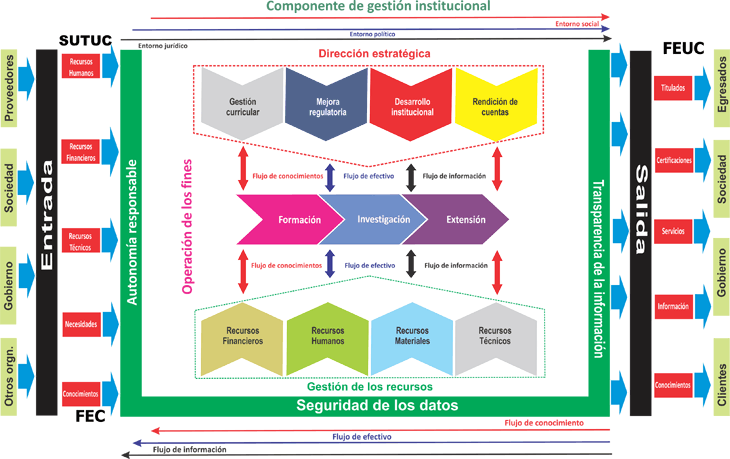The institutional management is the frame of reference to guide the planning, programming, use, transparency; evaluation and accountability of the human, financial, technical, and material resources in the institutional work; through the Responsible University Autonomy, Governability, Regulatory Improvement, Decentralization of Purposes, Planning Culture, Financial Resources Scheduling, Rationality in Expenditure; and use and implementation of the ICT in the management.
- Responsible University Autonomy: Legal capacity to achieve its purposes with broad freedom and to organize its own government.
- Governability, Degree of Efficiency, and Legitimacy: in the fulfillment of the University Government function. The capacity of directing and coordinating the development between personnel and organizational units, on whose contribution and synergy the institutional efficiency will depend.
- Regulatory Improvement: Set of legal instruments to establish the responsibilities, processes, and procedures that the members of the university community must fulfill to exercise a right or benefit.
- Decentralization of Purposes: The action of empowering the schools to execute the processes of training, research, cultural dissemination, and extension of services that favors the development of their environment.
- Planning and Programming Culture: of financial resources. Level of modernization of the legal frame that regulates the programming and budgeting linked to the Institutional Development Plan and the Annual Operational Plans.
- Rationality in Budget Expenditure: Establishment of practices and guiding principles of austerity and rationalization in operating and administrative expenditure, as well as the training of occupational structures of schools, centers, institutes, and university departments.
- The ICT in the management: The adoption of an operating model with systematic and automated focus that contributes to the execution of the institutional expenditure oriented towards specific results and goals.
